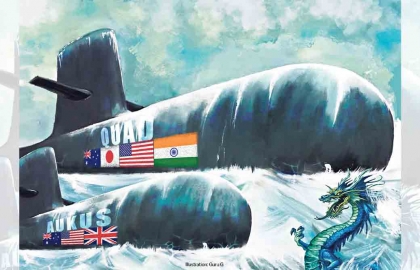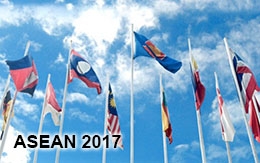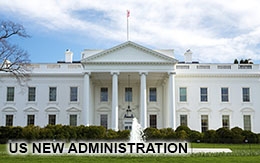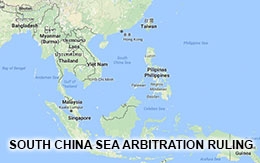The Quad and AUKUS: A Challenge to or Reinforcement of ASEAN-Centrality?
This presentation will focus on two separate and distinct minilateral institutions – the Quadrilateral Security Dialogue Forum (Quad) and AUKUS. The Quad and AUKUS share the same genesis: an impelling strategic concern among their members about the economic and military rise of China in the Indo-Pacific where China has spread its influence primarily through diplomatic, political and economic inducements accompanied by intimidation and coercion in the South China Sea. This presentation will discuss whether these two institutions challenge or reinforce ASEAN’s efforts to promote maritime cooperation.

Introduction
The title for Session 3 is “Glowing Vista: Synergizing New Momentum from Regional Minilateralism.” Panellists are asked to “examine the dynamics of bilateral, multilateral, and mini-lateral settings in the Indo-Pacific region to answer the question if mini-lateralism complement or compete with multilateralism; and to find ways in which new momentums or cooperation can be synergized to promote maritime cooperation through newly formed mini-lateral frameworks.”
The framing of this session raises at least two questions regarding definitions,. First, what is the difference between multilateralism and minilateralism? Second, what region are we talking about – Southeast Asia or the Indo-Pacific? These two questions are inter-related.
Multilateralism connotes a structured arrangement in which diverse states cooperate to achieve for mutual benefit. Minilateralism is a sub-set of multilateralism and involves fewer state actors cooperating in a less structured manner. Minilateralism is often viewed as a response to the deficiencies of multilateral institutions.
With respect to the second question there is no clear cut answer because of the diversity of state actors whose national interests simultaneously overlap and conflict. For example, the ten member states in ASEAN view Southeast Asia as a natural region. Outside powers with interests in Southeast Asia may operate within a wider geographical framework such as Asia, Asia-Pacific or Indo-Pacific.
This presentation will focus on two separate and distinct minilateral institutions – the Quadrilateral Security Dialogue Forum (Quad) and AUKUS. The Quad and AUKUS share the same genesis: an impelling strategic concern among their members about the economic and military rise of China in the Indo-Pacific where China has spread its influence primarily through diplomatic, political and economic inducements accompanied by intimidation and coercion in the South China Sea. This presentation will discuss whether these two institutions challenge or reinforce ASEAN’s efforts to promote maritime cooperation.
Quad
In 2017, India, Japan, United States and Australia revived the Quadrilateral Security Dialogue Forum. Over the last five years the Quad has become institutionalised through a three tiered structure – senior officials meetings, foreign ministers meetings and leaders’ meetings.
The Quad is a coordinating body focused entirely on non-traditional security issues; it has no permanent secretariat. The Quad leaders have met four times since 2017. At the most recent leaders’ meeting on 24 May 2022, a Quad Joint Leaders’ Statement was issued that identified nine areas of cooperation: (1) peace and stability in the Indo-Pacific, (2) COVID-19 and global health security, (3) infrastructure, (4) climate, (5) cybersecurity, (6) critical and emerging technologies, (7) QUAD fellowships, (8) space and (9) maritime domain awareness and humanitarian assistance/disaster relief.
Under point 1 the Quad leaders “committed to cooperation with partners in the region… We reaffirm our unwavering support for ASEAN unity and centrality and for the practical implementation of ASEAN Outlook on the Indo-Pacific.” The Quad leaders “strongly oppose any coercive, provocative or unilateral actions that seek to change the status quo and increase tensions in the area, such as militarization of disputed features, the dangerous use of coast guard vessels and maritime militia, and efforts to disrupt other countries’ offshore resource exploitation activities.”
With specific reference to maritime cooperation, the Quad leaders welcomed the U.S. Indo-Pacific Partnership for Maritime Domain Awareness initiative to respond to humanitarian and natural disasters and combat illegal fishing by working with regional fusion centres in the Indian Ocean, Southeast Asia and Pacific Islands. The Quad leaders also announced the establishment of the Quad Partnership on Humanitarian Assistance and Disaster Relief (HADR) in the Indo-Pacific. In September 2002, the Quad foreign ministers signed guidelines to implement the HADR initiative. These Guidelines made clear that “a request for international assistance is needed before the Quad partners may act in coordination under the Partnership.”
In sum, the Quad is ready, willing and able to work with ASEAN to advance maritime cooperation in Southeast Asia or to work with individual ASEAN member states. So far, however, there has been no institutional contact between the Quad and ASEAN. A review of the Quad’s agenda and outcomes of meetings at all levels since 2017 reveals that there have been no deep discussions or planning to jointly address traditional security issues due to divergences among Quad members.
AUKUS
On 15 September 2021, the leaders of Australia, United Kingdom and the United States met virtually and announced the formation of AUKUS, a trilateral security partnership. According to the joint statement issued by the three leaders, “We will promote deeper information and technology sharing. We will foster deeper integration of security and defense-related science, technology, industrial bases, and supply chains. And in particular we will significantly deepen cooperation on a range of security and defense capabilities.”
AUKUS is not a collective security alliance although Australia and the UK are each separately linked to the U.S. by defence treaties. There is no binding AUKUS agreement ratified by the respective legislatures of its three members.
The first initiative of the AUKUS security partnership was to “support Australia acquiring nuclear-powered submarines for the Royal Australian Navy.” In order to advance this initiative the three AUKUS members signed the Exchange of Naval Nuclear Propulsion Information Agreement.
The Joint Leaders Statement on AUKUS noted, “we resolve to deepen diplomatic, security, and defence cooperation in the Indo-Pacific region, including by working with partners in the region…” Prime Minister Scott Morrison, speaking on behalf of Australia, noted specifically, “AUKUS will also enhance our contributions to our growing network of partnerships in the Indo-Pacific region: ANZUS (Australia, New Zealand, United States) ; our ASEAN friends; our bilateral strategic partners, the Quad; and Five Eyes {intelligence sharing) countries; and, of course, our dear Pacific family.”
AUKUS has a three tiered decision-making structure comprising a Senior Officials Group, two Joint Steering Groups (Submarines and Advanced Capabilities) and seventeen working groups. Nine of the working groups fall under the Joint Steering Group on Submarines (information exchange, nuclear stewardship, Australian workforce, submarine basing, submarine construction, non-proliferation and three unidentified working groups). The remaining seven working groups fall under the Joint Steering Group Advanced Capabilities (quantum technologies, underseas capabilities, artificial intelligence and autonomy, cyber, hypersonics and counter hypersonics, innovation, information sharing and one unidentified working group).
AUKUS is an enhanced security partnership that promotes hard balancing against China’s rise through the provision of nuclear powered submarines to Australia and enhanced collaboration in cutting-edge military technologies among national defence industries. AUKUS leaders have not collectively issued a formal statement endorsing ASEAN-centrality and supporting the ASEAN Outlook on the Indo-Pacific.
The establishment of AUKUS precipitated immediate expressions of concern by Indonesia and Malaysia that it would raise regional tensions, set off an arms race, undermine non-proliferation, and marginalise ASEAN. President Joko Widodo (Jokowi) received an intelligence brief about AUKUS just before its official announcement. The Jakarta Post reported that Jokowi was “upset by Morrison’s diplomatic snub, even close to a betrayal, because Australia kept mum about its security act… until the very last minute.”
Indonesian Minister for Foreign Affairs Retno Marsudi and Minister for Defence Prabowo Subianto were kept in the dark as well. Foreign Minister Payne contacted her Indonesian counterpart on 16 September 2021 immediately after AUKUS was announced. On the following day, Indonesia’s Ministry of Foreign Affairs issued a brief five point statement that said, inter alia, “1. Indonesia takes note cautiously of the Australian Government’s decision to acquire nuclear-powered submarines. 2. Indonesia is deeply concerned over the continuing arms race and power projection in the region.” The statement also stressed the importance of Australia meeting its obligations to nuclear non-proliferation and its commitments to the ASEAN Treaty of Amity and Cooperation.
On 20 September 2021, Prime Minister Morrison spoke to President Jokowi by phone while travelling to attend the Quad meeting. Morrison pledged that Australia would honour its obligations under the Non-Proliferation Treaty and that AUKUS would contribute to stability and a “strategic balance” in the region. Jokowi was not mollified. According to an Australian media report, President Jokowi “repeatedly and forcefully” raised concerns about Australia’s planned acquisition of nuclear submarines when he spoke to Morrison on 27 October 2021 during the ASEAN-Australia Virtual summit.
Indonesian concerns were spelled out in greater detail on 28 September in an op-ed in The Jakarta Post written by Abdul Kadir Jailani, the Director General for Asian, Pacific and African Affairs within Indonesia’s Ministry of Foreign Affairs. Jailani wrote, “Such acquisitions of nuclear submarines raises concerns that an arms race characterised by increasing power projection capabilities in the region may be imminent. This new strategic posture is clearly intended to bolster deterrence in contested areas in the Indo-Pacific.”
In Malaysia, Prime Minister Ismail Sabri Yaakob said on 18 September 2021 that AUKUS could “provoke other powers to take more aggressive action in this region, especially in the South China Sea” and AUKUS could be a “catalyst for a nuclear arms race in the Indo-Pacific region.” Elsewhere in Southeast Asia, views were less critical. The Philippines supported AUKUS, while Singapore and Vietnam both took a neutral stance.
Conclusion
ASEAN’s centrality rests on its network of multilateral institutions that draws in the major powers in a conducive setting for dialogue – ASEAN Regional Forum, East Asia Summit, ASEAN Defence Ministers’ Meeting Plus, Expanded ASEAN Maritime Forum, etc. ASEAN has staked out its claim to centrality with a number of regional treaties designed to bolster regional security: Zone of Peace, Freedom and Neutrality Declaration (1971); Treaty of Amity and Cooperation in Southeast Asia (1976), and Treaty of Southeast Asia Nuclear Weapons-Free Zone (1995).
The Quad is now a permanent fixture in the security architecture of the Indo-Pacific. It is overwhelmingly focused on coordinating whole-of-government responses to major non-traditional security issues in the Indo-Pacific such as COVID-19 and global health, climate change, cyber security, disruptive and emerging technologies and the provision of funding for quality infrastructure.
The Quad reinforces ASEAN centrality and multilateralism. For example, the Quad has officially and repeatedly stated its support for ASEAN-centrality and endorsed the ASEAN Outlook on the Indo-Pacific. The Quad’s agenda closely parallels ASEAN’s agenda yet over the last five years no linkages have been developed between ASEAN and the Quad. Each member of the Quad is a long-standing ASEAN dialogue partner that participates annually in an ASEAN Plus One Summit.
ASEAN’s centrality could be enhanced in addressing non-traditional security issues if linkages with Quad members were elevated from a bilateral to a multilateral level. This would enhance synergy in cooperating to address maritime security issues including maritime domain awareness.
According to the ASEAN Outlook on the Indo-Pacific: “ASEAN may also seek to develop, where appropriate, cooperation with other regional and sub-regional mechanisms in the Asia-Pacific and Indian Ocean regions on specific areas of common interests to complement the relevant initiatives.” In short, ASEAN could develop an ASEAN Plus 4 dialogue with the Quad along the lines of ASEAN Plus Three (China, Japan, South Korea).
The ASEAN Plus Four could discuss practical cooperation in maritime security as listed in the ASEAN Outlook on the Indo-Pacific: “cooperation for peaceful settlement of disputes; promoting maritime safety and security, and freedom of navigation and overflight; addressing transnational crimes, including trafficking in persons or of illicit drugs, sea piracy, robbery and armed robbery against ships at sea; etc.
Major power rivalry is the main source of instability in the Indo-Pacific. On the one hand, AUKUS poses a challenge to ASEAN centrality and cooperation to address maritime security challenges because it exacerbates differences among ASEAN members on how to deal with major power rivalry and nuclear non-proliferation. On the other hand, Australia, the United Kingdom and the United States are all aligned to oppose China’s military rise and the threat China poses to regional stability.
This presentation concludes that minilateral institutions differ in their objectives and therefore on their ability to complement or compete with ASEAN multilateralism. For example, the Quad complements ASEAN’s centrality and ASEAN-related multilateral institutions. This opens the possibility of developing new institutional arrangements, such as the ASEAN Plus Four, to enhance synergism to promote maritime security cooperation. AUKUS largely competes with ASEAN multilateralism because it fills the space where ASEAN fears to tread by pursuing hard balancing against China’s rise.
Carl Thayer is Emeritus Professor of Politics and Visiting Fellow, School of Humanities and Social Sciences, UNSW Canberra (February 2018-December 2020). He is also Director of Thayer Consultancy, a small business registered in Australia in 2002 that provides political analysis of current regional security issues and other research support to selected clients.










